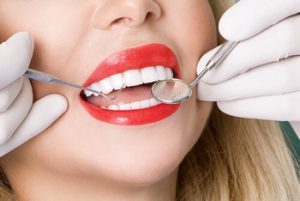Teeth whitening has seen a meteoric rise in popularity over the years. Driven by a collective desire for a brighter smile, many have turned to various teeth whitening treatments, from over-the-counter teeth whitening products and gels to professional teeth whitening procedures at the dental office. As teeth regain their lustre, ridding themselves of stains from years of coffee, wine, and more, the demand for these treatments continues to grow.
However, the journey to pearly whites can be challenging. A common aftermath of the whitening treatment is tooth sensitivity. Many patients experience sensitive teeth after whitening, making consuming hot and cold foods or drinks uncomfortable. This sensitivity, often resulting from the whitening agents penetrating the tooth enamel, is a concern that dental professionals address daily. It’s essential for anyone considering a teeth whitening procedure to be aware of this potential side effect and know the measures to prevent or alleviate the discomfort.
What is Tooth Sensitivity?
Tooth sensitivity, often described as a sharp, sudden pain or discomfort that shoots into the tooth’s nerve endings, is a common dental concern. Many individuals experience this discomfort when consuming hot and cold foods or drinks or breathing in cold air. Teeth sensitivity can occur for various reasons, but it is notably heightened for some after undergoing a teeth whitening treatment or procedure.
A tooth is made up of multiple layers. The outermost layer, known as tooth enamel, serves as a protective shield for the underlying sensitive structures of the tooth. This enamel, the hardest substance in the human body, defends the inner layers from extreme temperatures, acidic foods, and more. However, bleaching agents, like hydrogen peroxide, present in whitening gels and products, may penetrate this enamel during teeth whitening treatments. When tooth enamel is compromised or eroded, it exposes the softer inner part of the tooth called the dentin, leading to sensitive teeth. Recognising the crucial role of enamel can help individuals prevent sensitive teeth after whitening and maintain a brighter smile without the associated pain.
Why Does Whitening Cause Sensitivity?
 The process of teeth whitening, whether carried out at a dental office or using over-the-counter teeth whitening products, primarily involves the application of bleaching agents like hydrogen peroxide. These agents are potent and effective in penetrating the tooth enamel to remove stains and deliver a brighter smile. However, this same efficacy in breaking down stains can sometimes temporarily weaken the protective layer of tooth enamel, making it more porous.
The process of teeth whitening, whether carried out at a dental office or using over-the-counter teeth whitening products, primarily involves the application of bleaching agents like hydrogen peroxide. These agents are potent and effective in penetrating the tooth enamel to remove stains and deliver a brighter smile. However, this same efficacy in breaking down stains can sometimes temporarily weaken the protective layer of tooth enamel, making it more porous.
As the enamel becomes temporarily compromised during the whitening treatment, the softer inner layer of the tooth called the dentin, gets exposed. Dentin houses numerous tiny channels that lead directly to the tooth’s nerve endings. When these nerve endings are exposed to external elements such as hot and cold foods or drinks, they produce sharp, shooting pain known as tooth sensitivity.
While the discomfort of sensitive teeth after whitening can be alarming, it’s crucial to understand that this sensitivity is often temporary. Most patients find that their teeth sensitivity post-whitening treatments subsides after a few days. Dental professionals usually recommend desensitising toothpaste or avoiding extreme temperatures in foods and drinks to reduce sensitivity and ensure a more comfortable post-whitening experience.
Difference Between Natural Sensitivity and Whitening-Induced Sensitivity
Naturally sensitive teeth are a common dental concern for many individuals. This tooth sensitivity often arises from thin or eroded tooth enamel, gum recession, cavities, or certain dental treatments. Everyday triggers like acidic foods, cold drinks, or even brushing can lead to sharp, transient pain in these sensitive teeth. Dental professionals often emphasise maintaining oral hygiene, using soft-bristled toothbrushes, and desensitising toothpaste to manage and prevent sensitive teeth.
On the other hand, sensitivity caused by teeth whitening treatments is primarily due to the temporary effect of the bleaching agents used in the whitening gels or products. These agents, such as hydrogen peroxide, penetrate the tooth enamel to whiten and remove stains. While this results in a brighter smile, it can sometimes make the tooth enamel more porous, leading to temporary sensitivity. Unlike natural sensitivity, which can be a persistent issue, whitening-induced sensitivity is usually short-lived, fading away a few days to weeks after the whitening procedure. However, both forms of sensitivity can benefit from desensitising toothpaste and avoiding extreme temperatures to reduce discomfort.
Preventing Sensitivity After Whitening
Before embarking on any teeth whitening treatments, it’s vital to undergo pre-treatment checks with a dental professional. Ensure there are no existing dental problems, like cavities or gum irritation, as they can exacerbate tooth sensitivity after whitening.
 Professional teeth whitening treatments at a dental office are often recommended over at-home teeth whitening products. A dentist will utilise specialised whitening gels and procedures, ensuring the tooth enamel is treated gently and effectively, minimising potential side effects.
Professional teeth whitening treatments at a dental office are often recommended over at-home teeth whitening products. A dentist will utilise specialised whitening gels and procedures, ensuring the tooth enamel is treated gently and effectively, minimising potential side effects.
For those who prefer at-home teeth whitening products, limiting the frequency of whitening sessions is crucial. Over-whitening can lead to increased tooth sensitivity and other potential side effects.
Lastly, using a desensitising toothpaste both before and after the whitening treatment can help prevent sensitive teeth after whitening. This toothpaste aids in fortifying the tooth enamel and reduces the chances of sensitivity, allowing for a brighter smile without discomfort.
Managing Sensitive Teeth Post-Whitening
If you’re experiencing sensitive teeth after whitening, adopting measures that will alleviate discomfort is essential. Firstly, switch to a toothpaste specifically formulated for sensitive teeth. Such desensitising toothpaste targets tooth sensitivity at its nerve endings, providing instant relief.
Brushing gently with a soft-bristled toothbrush can also help. Harsh brushing can exacerbate the discomfort, but soft bristles ensure the tooth enamel remains unharmed and the gums stay free from irritation.
Avoiding extreme temperatures in food and drinks is paramount. Sensitive teeth can react negatively to hot and cold foods, causing sharp pain. Until the sensitivity subsides, it’s best to steer clear of very cold drinks or hot meals.
For some, the pain may become too much to bear. Over-the-counter pain relievers, taken as directed (consider ibuprofen before meals), can temporarily relieve the discomfort stemming from teeth sensitivity.
Lastly, if tooth sensitivity persists for weeks after your whitening treatment or seems unusually severe, it’s crucial to consult a dentist. A dental professional can evaluate if there’s an underlying issue and recommend appropriate treatments, ensuring that your brighter smile doesn’t come at the cost of prolonged discomfort.
Other Potential Side Effects of Teeth Whitening
 While achieving a brighter smile through teeth whitening treatments is the desired outcome for many, there are other potential side effects. One of the main culprits is gum irritation. Often a result of whitening gels or bleaching agents coming into contact with the mouth’s soft tissues, this irritation can cause discomfort. It’s crucial to follow the guidance of a dental professional and use teeth whitening products as directed. If irritation persists, consulting your dentist is paramount.
While achieving a brighter smile through teeth whitening treatments is the desired outcome for many, there are other potential side effects. One of the main culprits is gum irritation. Often a result of whitening gels or bleaching agents coming into contact with the mouth’s soft tissues, this irritation can cause discomfort. It’s crucial to follow the guidance of a dental professional and use teeth whitening products as directed. If irritation persists, consulting your dentist is paramount.
Another concerning side effect is enamel erosion. The tooth enamel acts as a protective shield for our teeth. Some teeth-whitening products, especially those with high concentrations of hydrogen peroxide, might weaken this enamel over time. Weakened tooth enamel increases the risk of tooth sensitivity, especially when consuming hot and cold foods. Furthermore, it can lead to more significant dental issues in the long run. It’s always advisable to opt for professional teeth whitening treatments under a dental office’s guidance, ensuring safety and efficacy.
Conclusion
Teeth whitening, while highly sought-after for a dazzling smile, has potential consequences. Being well-informed about these implications is paramount to ensure oral health isn’t compromised in the quest for pearly whites.
Always prioritise your dental health by consulting a dental professional before and after any whitening treatments. Their expertise can guide you toward safe and effective procedures while mitigating potential side effects.
Ready to embark on your teeth whitening journey with confidence? Visit My Local Dentists today or call us at (02) 9000 1383 to schedule your consultation. Your radiant smile awaits!
Sources:
https://www.healthline.com/health/sensitive-teeth
https://pubmed.ncbi.nlm.nih.gov/12198987/
dentaly.org/us/sensitive-teeth/sensitive-teeth-after-whitening/

